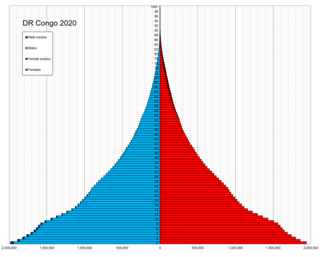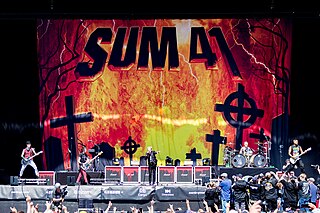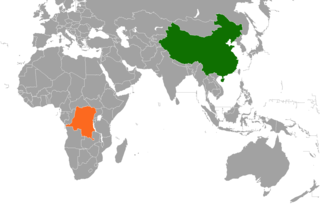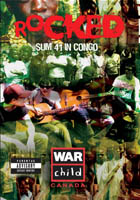
Demographic features of the population of the Democratic Republic of the Congo include ethnicity, education level, health, economic status, religious affiliations and other aspects of the population.

The Democratic Republic of the Congo, also known as Congo-Kinshasa, Congo-Zaire, Congo DR, DR Congo, DRC, or simply either Congo or the Congo, is a country in Central Africa. By land area, the DRC is the second-largest country in Africa and the 11th-largest in the world. With a population of around 105 million, the Democratic Republic of the Congo is the most populous Francophone country in the world. The national capital and largest city is Kinshasa, which is also the economic center. The country is bordered by the Republic of the Congo, Central African Republic, South Sudan, Uganda, Rwanda, Burundi, Tanzania, Zambia, Angola, the Cabinda exclave of Angola, and the South Atlantic Ocean.

Coltan is a dull black metallic ore from which the elements niobium and tantalum are extracted. The niobium-dominant mineral in coltan is columbite, and the tantalum-dominant mineral is tantalite.

Sum 41 is a Canadian rock band from Ajax, Ontario. The band was formed in 1996 and currently consists of Deryck Whibley, Dave Baksh, Jason McCaslin, Tom Thacker, and Frank Zummo.

Joseph Kabila Kabange is a Congolese politician who served as President of the Democratic Republic of the Congo between January 2001 and January 2019. He took office ten days after the assassination of his father, President Laurent-Désiré Kabila in the context of the Second Congo War. He was allowed to remain in power after the 2003 Pretoria Accord ended the war as the president of the country's new transitional government. He was elected as president in 2006 and re-elected in 2011 for a second term. Since stepping down after the 2018 election, Kabila, as a former president, serves as a senator for life.

Chuck is the third studio album by Canadian rock band Sum 41. The album was released on October 12, 2004. It is the last album to feature guitarist Dave Baksh as he left Sum 41 on May 11, 2006. Baksh later rejoined the band in 2015. Chuck peaked at No. 2 on the Canadian Albums Chart and No. 10 on the US Billboard 200, making it the band's highest-charting album until it would be surpassed by Underclass Hero in 2007.

The United Nations Organization Stabilization Mission in the Democratic Republic of the Congo or MONUSCO, an acronym based on its French name Mission de l'Organisation des Nations Unies pour la stabilisation en République démocratique du Congo, is a United Nations peacekeeping force in the Democratic Republic of the Congo (DRC) which was established by the United Nations Security Council in resolutions 1279 (1999) and 1291 (2000) to monitor the peace process of the Second Congo War, though much of its focus subsequently turned to the Ituri conflict, the Kivu conflict and the Dongo conflict. The mission was known as the United Nations Mission in the Democratic Republic of Congo or MONUC, an acronym of its French name Mission de l'Organisation des Nations Unies en République démocratique du Congo, until 2010.

"We're All to Blame" is a song by Canadian rock band Sum 41. It was released to radio on August 31, 2004, as the first single from Chuck.
Thomas Lubanga Dyilo is a convicted war criminal from the Democratic Republic of the Congo (DRC) and the first person ever convicted by the International Criminal Court (ICC). He founded and led the Union of Congolese Patriots (UPC) and was a key player in the Ituri conflict (1999–2007). Rebels under his command have been accused of massive human rights violations, including ethnic massacres, murder, torture, rape, mutilation, and forcibly conscripting child soldiers.

The mining industry of the Democratic Republic of the Congo produces copper, diamonds, tantalum, tin, gold, and more than 63% of global cobalt production. Minerals and petroleum are central to the DRC's economy, making up more than 95% of the value of its exports. According to a 2011 report the total value of the major mineral reserves in the DRC amounted to a total of over 300 billion US dollars at the time. The mining industry in the DRC mainly consists of private, large industrial mines, semi-industrial, and artisanal mines. While private sectors take on large operations, they rely heavily on artisanal mining for extraction of resources. These industries along with non-for-profit organizations are continuously changing their guidelines as the DRC becomes more and more desirable for their valuable minerals. Mining in the DRC took place beginning in the 14th century and is still very present today, with mass scale lootings halting many major projects. The main countries involved in the mining operations in the DRC are Canada and China along with 25 other international mines active in the area. While technological companies strive for sustainable production and consumption of their products using cobalt, this is often achieved by the work of artisanal mining in hazardous and unjust working conditions. The process of mining and extraction in any area has negative impacts on the environment and those living in it, however, the DRC has faced many acts of environmental injustice including child labor under fatal conditions, exploitation of laborers, and displacement.

The Kivu conflict is an umbrella term for a series of protracted armed conflicts in the North Kivu and South Kivu provinces in the eastern Democratic Republic of the Congo which have occurred since the end of the Second Congo War. Including neighboring Ituri province, there are more than 120 different armed groups active in the eastern Democratic Republic of Congo. Currently, some of the most active rebel groups include the Allied Democratic Forces, the Cooperative for the Development of the Congo, the March 23 Movement, and many local Mai Mai militias. In addition to rebel groups and the governmental FARDC troops, a number of national and international organizations have intervened militarily in the conflict, including the United Nations force known as MONUSCO, and an East African Community regional force.

Women in the Democratic Republic of the Congo have not attained a position of full equality with men, with their struggle continuing to this day. Although the Mobutu regime paid lip service to the important role of women in society, and although women enjoy some legal rights, custom and legal constraints still limit their opportunities.
Bosco Ntaganda is a convicted war criminal and the former military chief of staff of the National Congress for the Defense of the People (CNDP), an armed militia group operating in the North Kivu province of the Democratic Republic of the Congo (DRC). He is a former member of the Rwandan Patriotic Army and allegedly a former Deputy Chief of the General Staff of the Patriotic Forces for the Liberation of Congo (FPLC), the military wing of the Union of Congolese Patriots.

The Democratic Republic of the Congo, and the east of the country in particular, has been described as the "Rape Capital of the World", and the prevalence and intensity of all forms of sexual violence has been described as the worst in the world. Human Rights Watch defines sexual violence as "an act of a sexual nature by force, or by threat of force or coercion", and rape as "a form of sexual violence during which the body of a person is invaded, resulting in penetration, however slight, of any part of the body of the victim, with a sexual organ, or of the anal or genital opening of the victim with any object or other part of the body."

The People's Republic of China (PRC) and the Democratic Republic of the Congo (DRC) have maintained diplomatic relations since 1961 and contacts between the two regions stretch back to 1887 when representatives of the Congo Free State established contacts with the court of the Qing dynasty. The first treaty between the two powers was signed in 1898.
The Democratic Republic of the Congo (DRC) is a source and destination country for men, women, and children subjected to trafficking in persons, specifically conditions of forced labor and forced prostitution. The majority of this trafficking is internal, and much of it is perpetrated by armed groups and government forces outside government control within the DRC's unstable eastern provinces.

Dan Gertler is an Israeli billionaire businessman in natural resources and the founder and president of the DGI group of companies. Until 2022, He had diamond and copper mining interests in the Democratic Republic of the Congo (DRC), and has invested in iron ore, gold, cobalt, oil, agriculture, and banking. As of 2024 his fortune was estimated at $1.5 billion by Forbes.
Prostitution in the Democratic Republic of the Congo is legal but related activities are prohibited. The Congolese penal code punishes pimping, running a bawdy house or brothel, the exploitation of debauchery or prostitution, as well as forced prostitution. Activities that incite minors or promote the prostitution of others have been criminalised. The government does little to enforce the law. During the colonial era and the years that followed independence, the Ministry of Health issued calling cards identifying professional sex workers and provided them with medical health checks. However, this system was abandoned in the 1980s. Public order laws are sometimes used against sex workers. Street prostitutes report harassment, violence and extortion from the police. UNAIDS estimated there are 2.9 million sex workers in the country.

During the first and second civil conflicts which took place in the Democratic Republic of the Congo (DRC), all sides involved in the war actively recruited or conscripted child soldiers, known locally as Kadogos which is a Swahili term meaning "little ones". In 2011 it was estimated that 30,000 children were still operating with armed groups. The United Nations Organization Stabilization Mission in the Democratic Republic of the Congo (MONUSCO), released a report in 2013 which stated that between 1 January 2012 and August 2013 up to 1,000 children had been recruited by armed groups, and described the recruitment of child soldiers as "endemic".
Child marriage in the Democratic Republic of the Congo is the eighteenth highest in the world. In a child marriage, one or both parties are under the age of eighteen years old. In the Democratic Republic of the Congo (DRC), 37% of girls are married before they turn eighteen, and 10% of girls are married before age fifteen. Though significantly less than the rate of child marriage for girls, 6% of boys in the DRC are married before age eighteen.















